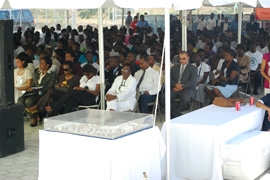Consider this: 90 miles from the sandy beaches of Miami lies Haiti, the most impoverished country in the entire Western Hemisphere. Instead of private doctors and state-of-the-art emergency departments, the bulk of the population of Haiti lives in abject poverty, and bears the brunt of the burden of disease. Access to health care is virtually impossible, especially in rural areas. The contrast between the luxury beach cabana and the ramshackle hut for a family of eight couldn't be more stark or hopeless.
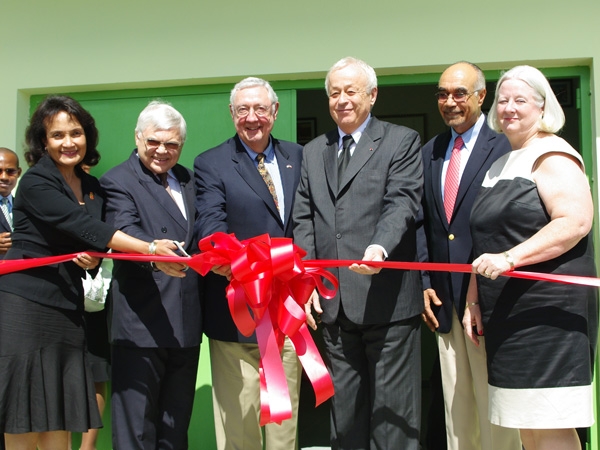
(From left) Dr. Marie Marcelle Deschamps, a physician at GHESKIO; Christian Connan, French ambassador to Haiti; Dr. Warren D. Johnson Jr., the Kean Professor of Tropical Medicine and director of the Center for Global Health at Weill Cornell; Alain Mérieux, president of BioMérieux; Dr. Jean Pape, founder and director of GHESKIO; and Janet Ann Sanderson, U.S. ambassador to Haiti.
Rather than wait for government intervention, in 1982, a small group of dedicated physicians and researchers began to study cases of infantile diarrhea and dehydration in Haiti. Eventually, they broadened their scope to include typhoid fever and an increasing number of previously healthy young men coming down with diarrhea and tuberculosis. The source of AIDS was also on the horizon.
The clinic that was started by this pioneering group, GHESKIO (Groupe Haitien d'Etude du Sarcome de Kaposi et des Infections Opportunistes, or the Haitian Group for the Study of Kaposi's Sarcoma and Opportunistic Infections), has since brought more than 25 years of hope and healing to a nation deeply scarred by disease and despair.
The accomplishments attributed to GHESKIO, one of the few health care centers in the country, are due in large measure to the leadership of Dr. Jean Pape, Professor of Medicine at Weill Cornell Medical College, and Dr. Warren Johnson, the B.H. Kean Professor of Tropical Medicine and Director of the Center for Global Health at the Medical College. Dr. Pape, a native of Haiti, graduated from the Medical College in 1975 and returned to his homeland to study child diarrhea and infant mortality.
What began as a relatively small but prolific clinic carrying out its mission of treatment, service and research, GHESKIO now employs a staff of more than 350 and recently celebrated the opening of a second facility in Haiti, a laboratory named in honor of Dr. Johnson, a physician who has dedicated his career to international medicine and the study of infectious diseases.
In a special ceremony on Feb. 10, hundreds of guests gathered for the formal opening of the Warren D. Johnson Jr. Medical Center and the Laboratories Rodolphe Mérieux, now a part of GHESKIO's new Institute of Infectious Diseases and Reproductive Heath.

(From left) Dr. Warren D. Johnson Jr., Alain Mérieux, Dr. Jean Pape and Dr. Andrew I Schafer.
"The GHESKIO team has persevered through adversity and has thrived," Dr. Johnson said. "We were told many times over the years that it couldn't be done, let alone be done in Haiti. But it was done, and often for the first time anywhere. It has been my joy, my honor, to participate in this vision."
GHESKIO was responsible for documenting the first cases of AIDS in a developing country, and today provides testing, counseling and care for adults, adolescents and children. In 2000, the Haitian government designated GHESKIO a "public utility," as it had proven to be so essential to the welfare of the Haitian people. The GHESKIO team offered the first description of AIDS in a resource-poor country, as well as new therapies and approaches for tuberculosis, diarrheal illness, typhoid and AIDS. Social programs, including nutrition, counseling for victims of violence, and microcredit programs, have also been developed.
The GHESKIO center is located in Haiti's capital and largest city, Port-au-Prince. The Warren D. Johnson Jr. Medical Center and the Laboratories Rodolphe Mérieux are located in the northern part of the city. With two facilities, about a 30-minute drive from each other, GHESKIO will be able to serve a large patient population.
Even before there was GHESKIO, Dr. Pape saw the need and established a rehydration unit to treat infants with diarrhea and dehydration at the Sate University Hospital in Port-au-Prince. After the program's inception, the pediatric mortality rate for diarrhea in the hospital dropped from 40 percent to an amazing 1 percent.
"I wonder how different life would have been if I did not cross your path 38 years ago as an anxious first-year medical student," Dr. Pape said to Dr. Johnson at the opening ceremony. "You guided my career as a young physician, gave me the opportunity to train in your lab as an infectious diseases fellow, and supported wholeheartedly my determination to return to Haiti and make a difference in my own country."
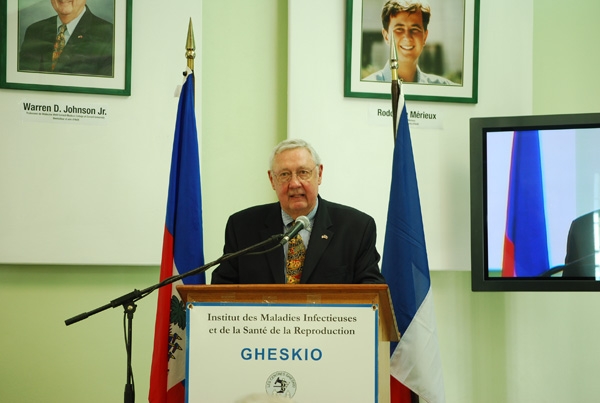
Dr. Johnson has been involved in GHESKIO since its founding in 1982.
As part of the opening of the new clinical facility, several Weill Cornell faculty members, including Dr. Andrew I. Schafer, Chairman of the Department of Medicine, along with a number of Haitian dignitaries, including Prime Minister Michèle Duvivier Pierre-Louis, attended training and service presentations led by Drs. Pape and Johnson.
Dr. Linnie M. Golightly, Associate Professor of Clinical Medicine at Weill Cornell, once a resident under Dr. Johnson and still a collaborator with the clinicians at GHESKIO, was on hand to see her colleague honored.
"There is nothing I have seen like Dr. Johnson's dedication to the people of Haiti," Dr. Golightly said. "The people that came to the clinic were outcasts. It was a disease nobody wanted to care for. GHESKIO believed in fighting for those people when nobody else would."
As part of the program marking the opening of the new facility, GHESKIO researchers, along with Haitian physicians and students from Cornell University, gave presentations to visiting physicians from the Caribbean, the U.S., France and elsewhere. The latest ongoing research and clinical practices at GHESKIO were discussed, including recent research suggesting that failure to recognize active tuberculosis at initiation of antiretroviral therapy leads to increased mortality.
Speaking of the work that Weill Cornell and others have supported in Haiti over many years, Dr. Andrew Schafer commented that it was initially the product of the hard work of a few, namely Drs. Pape and Johnson, Mado Boncy, Jean Robert Mathurin, Franck Thomas, Claude Pean, Claude Laroche, Moliere Pamphile, Rudy Malebranche, Gladys Lauture, Gabriel Thimothe, Marie Marcelle Deschamps, Marieu Beaulieu and Rose Verdier, and that the continued success of GHESKIO truly represents the collaboration of nations, scientists and the academic and corporate sectors.
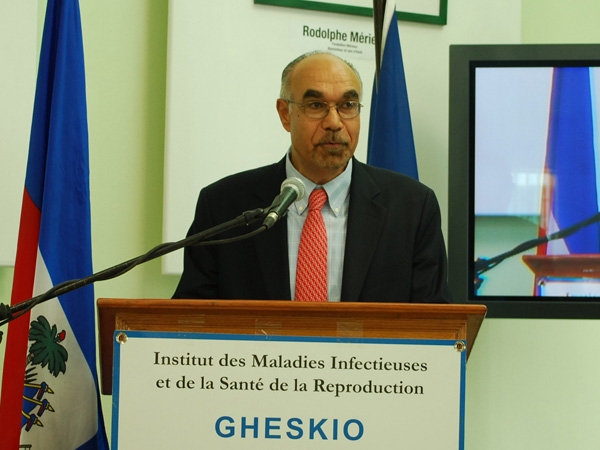
Dr. Pape gives praise and thanks to Dr. Johnson, who helped guide him on his path of medicine.
Dr. Pape said, "Without the support and contributions of Weill Cornell, the Ministry of Health and Population, the Haitian Medical Association, Biomérieux Foundation, Centers for Disease Control, the French Cooperation and Japanese Cooperation Agencies, Partners in Health, and the NIH Fogarty International Center, GHESKIO would never have developed."
Thanks to the lifelong dedication of the GHESKIO founders, hope has taken hold in Haiti.
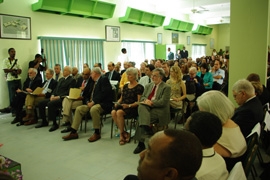
Hundreds gathered inside and in the courtyard of the Warren D. Johnson Jr. Medical Center.
